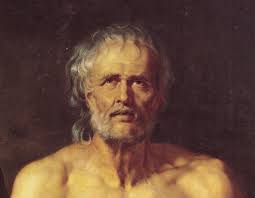The two great, but very different, dramatic traditions of the age—French neoclassical tragedy and Elizabethan tragedy—both drew inspiration from Seneca. Usually, the Senecan tragedy focuses heavily on supernatural elements. One thing that stands out from Seneca is that he is one of the most enjoyable and readable of all ancient philosophers. Part of it was due to the fact that his most notable works came in the form of letters.
He was born in southern Spain over 2,000 years ago and educated in Rome. He was the son of Seneca the Elder, a well-known Roman writer as well as later in his life uncle to the poet Lucan. Seneca pursued a career in politics and became a high-ranking financial clerk. During this period he also wrote tragedies as well as his Consolation to Marcia, which is part of his works on consolation.
His life took a sharp turn in 41 A.D. once Claudius became the emperor as he exiled Seneca to the island of Corsica on the premises of supposed adultery with Julia Livilla, the emperor’s niece and Caligula’s sister. During his exile, he wrote a letter to his mother consoling her during his exile. Eight years later, in another twist, Agrippina, mother of future emperor Nero and wife of Claudius secured permission for Seneca to return and for him to become her son’s tutor and adviser. Nero later became one of the most notorious and tyrannical emperors in the history of the Roman Empire raising even more questions about Seneca’s character. Not surprisingly, Seneca’s wealth came largely while in service to Nero. It is fitting to mention at this point that Seneca’s death, in 65 A.D., came by the orders of Nero himself (who thought Seneca was part of a plot against him which purpose was to assassinate Nero and replace him with Gaius Piso).
Throughout all those turbulent periods Stoicism remained a constant in his life. Seneca’s exposure to the philosophy came from Attalus, a Stoic philosopher who was Seneca’s early teacher. Seneca was also an admirer of Cato, whose name appears regularly in his writing. Nonetheless, Seneca didn’t confine himself only to Stoicism—he borrowed liberally from other schools, as we see him citing Epicurus in several instances. After his death, Seneca was an influence on notable figures such as Erasmus, Francis Bacon, Pascal, Montaigne down to modern days as we are seeing a revived interest in him.
On the Shortness of Life This collection of three short letters might be the best introduction to Seneca. The main one, On the Shortness of Life, is a stringent reminder about the non-renewability of our most important resource: our time. One of his most famous quotes comes from this writing and is worth reflecting upon: “We are not given a short life but we make it short, and we are not Ill-supplied but wasteful of it.”
Letters from a Stoic From the looks of it, Seneca was a trusted friend who gave great advice to his friends. Now we can read those letters and they can guide us through problems with grief, wealth, anger, poverty, success, failure, education and so many other things.
Seneca Quotes
“Time discovers truth.” — Seneca
“A gem cannot be polished without friction, nor a man perfected without trials.” — Seneca
“Wherever there is a human being, there is an opportunity for a kindness.” — Seneca
“We are more often frightened than hurt; and we suffer more from imagination than from reality.” — Seneca
“A gift consists not in what is done or given, but in the intention of the giver or doer.” — Seneca
“All cruelty springs from weakness.” — Seneca
“As is a tale, so is life: not how long it is, but how good it is, is what matters.” — Seneca
“If a man knows not to which port he sails, no wind is favorable.” — Seneca
“He suffers more than necessary, who suffers before it is necessary.” — Seneca
“Timendi causa est nescire — Ignorance is the cause of fear.” — Seneca
“It does not matter what you bear, but how you bear it.” — Seneca
“The man who has anticipated the coming of troubles takes away their power when they arrive.” — Seneca
“The whole future lies in uncertainty: live immediately.” — Seneca

